Aromatic Echoes: Classical Perfumery of Greece and Rome
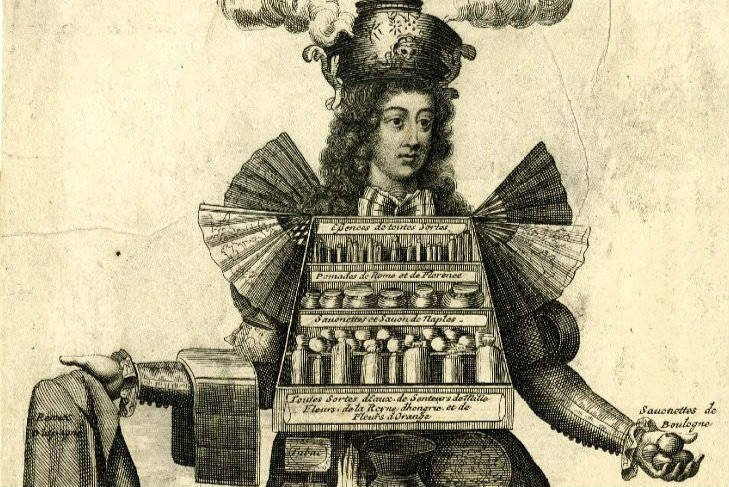
The art of perfumery originated in the ancient land of Egypt and found its way into the hearts and homes of the Greeks and Romans, shaping their rituals, ceremonies, and social customs. Drawing inspiration from the rich traditions of Egypt, the Greeks and Romans embraced perfume with intense fervor. Scent became an integral part of their daily lives, symbolizing status, refinement, and spiritual connection.
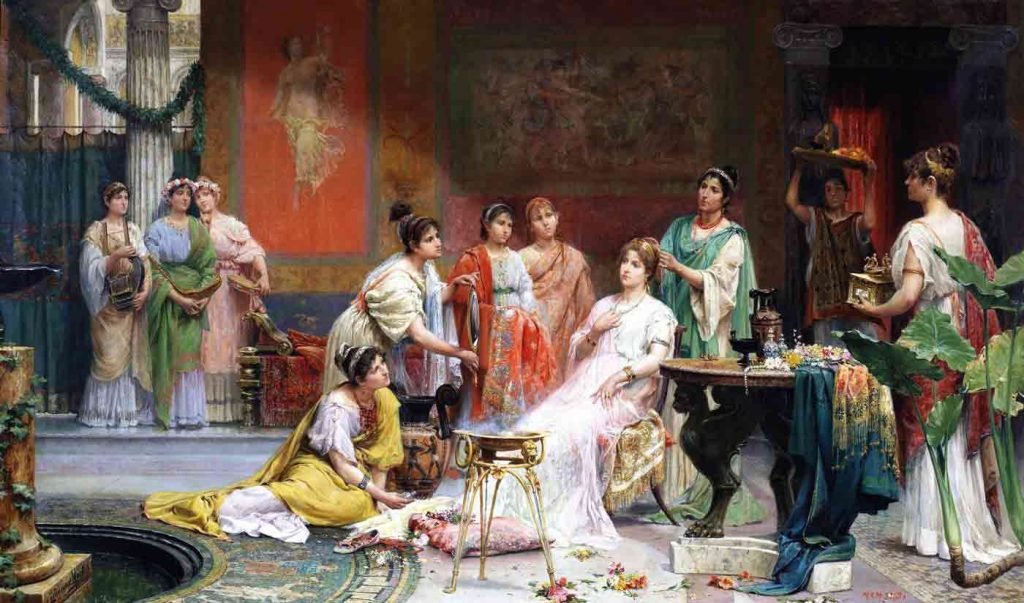
As we delve into the history of perfumery in ancient Greece and Rome, we uncover a vibrant tapestry of olfactory artistry, where each fragrance tells a story of cultural exchange and innovation. Join us on a journey where the legacy of perfume continues to captivate our senses and enrich our understanding of human civilization.
The emergence and development of Greek and Roman perfumery finds its roots in the ancient land of Egypt, where the art of fragrance reached sublime heights. The Egyptians are revered for their mastery of aromatic blends, they crafted perfumes that enraptured the senses and captivated the soul. From the heady incense of temple rituals to the exquisite oils used in personal adornment, scent permeated every aspect of Egyptian life, laying the groundwork for its distribution across the ancient world.
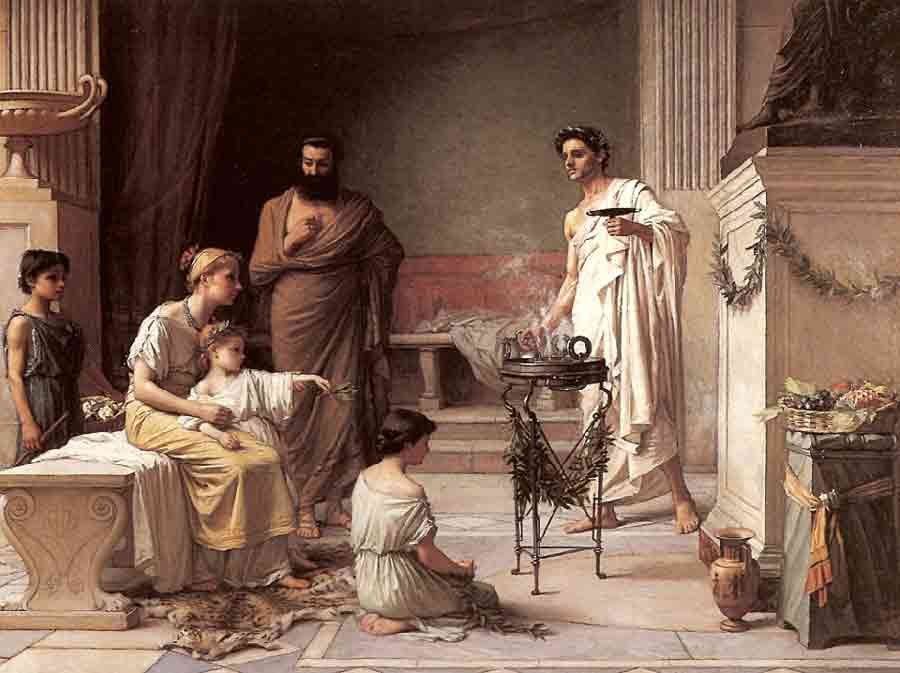
The Greeks inherited this olfactory legacy from Egypt and embraced perfume. Early Greek society was restrained in its appreciation for fragrances, and it was not until the zenith of their civilization in the 4th century B.C. that perfume found widespread favor among the populace. The conquests of Alexander the Great furthered this transformation of opinion, as the spoils of Egypt flowed into Greece, enriching its culture with exotic imported botanical treasures.
The art of perfume-making emerged as a testament to human ingenuity and creativity. The pursuit of aromatic excellence transcended borders and cultures, it spread across the sun-drenched shores of Cyprus to the bustling streets of Athens and Rome.
Archaeologists unearthed the earliest evidence of perfumery on the island of Cyprus. But it was the ancient Greeks who elevated perfume-making to an art form, experimenting with a myriad of botanicals and blending techniques to create intoxicating fragrances that enraptured the senses.
Drawing inspiration from the bountiful flora of their homeland, the Greeks infused oils with local plants such as marjoram, parsley, irises, violets, and lilies, as well as exotic spices imported from the East. The Greeks boiled flower petals, herbs, and spices in carrier oils like olive oil and crafted concoctions that delighted both gods and mortals alike. The Greeks were the first to encounter the concept of Animalic perfumes, fragrances derived from animal sources, which contribute a musky and enticing quality to scent.

Perfume became a part of everyday life in ancient Greece, with shops cropping up across Athens to cater to the growing demand. As the popularity of perfume soared, artists began crafting exquisite vessels and bottles to store these precious oils, transforming them into objects of desire and collectors’ items. The ancient Greeks created perfume bottles designed to hold liquid scents. Terracotta, alabaster, and metal became the materials of choice for these vessels, each bearing the mark of its creator and adding to its allure. From intricate animal shapes to delicate bird motifs, these vessels adorned the homes of the elite, reflecting their appreciation for beauty and craftsmanship.
In addition to smaller vessels, every Greek home boasted an “exaleiptron,” a larger vessel used for storing copious amounts of perfume. Beyond mere ornamentation, these vessels held religious significance and were used in important rituals, symbolizing the sacred bond between mortals and the divine.
As the art of perfume-making flourished in Greece, so too did the knowledge of medicinal plants, thanks in part to the pioneering work of Hippocrates, the “Father of Medicine.” Hippocrates’ treatises on medicinal plants not only laid the foundation for herbal medicine but also influenced the gathering and preparation of herbs for perfume-making. With meticulous care and attention to detail, the ancient Greeks embraced aromatherapy as a holistic approach to health and well-being.
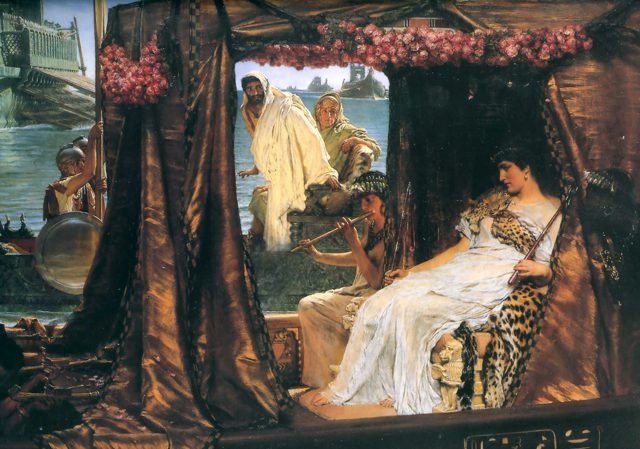
In the pantheon of Greek deities, perfume held a sacred significance. Scent was believed to be a divine gift bestowed upon mortals as a token of favor from the gods. Named after goddesses and imbued with mystical properties, perfumes became an integral part of religious rituals and ceremonial rites, sanctifying life’s passages from birth to death. The Greeks, growing mindful of the power of scent, practiced aromatherapy and used fragrances to enhance health, vitality, and mood.
Perfume traveled in Greek society from the sacred to the mundane. At public festivals, fragrant waters perfumed the air, invoking a sense of jubilation and reverence. Hospitality, too, was imbued with the fragrance, as guests were welcomed with perfumed foot baths. Bathing rituals, steeped in luxury and opulence, became elaborate affairs where perfumes played a central role in the pursuit of beauty, purification and hygiene.
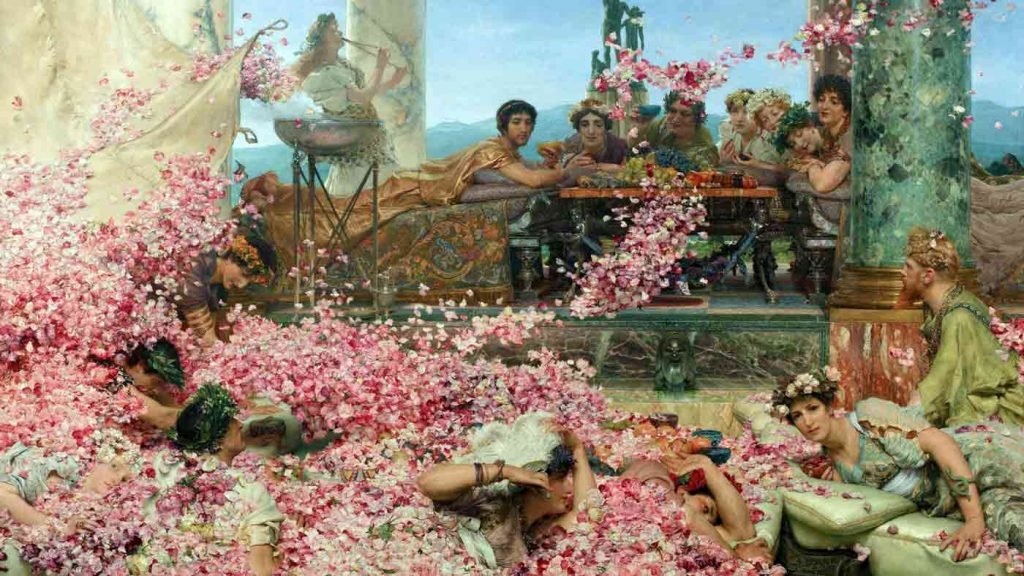
The Romans, heavily influenced by Greece, accepted perfume with equal gusto, integrating it into the fabric of their expanding empire. Drawing upon the traditions of Egypt and Greece, the Romans refined and elevated perfumery to new heights of sophistication and luxury. Like their Greek predecessors, the Romans viewed perfume as a symbol of status and refinement, adorning themselves with fragrant oils and balms as a testament to their wealth and social standing.
In Roman society, perfume was not merely a luxury; it was a necessity, most important in personal grooming, hygiene, and ritualistic practices. Patricians, the Roman upper class, indulged in scented massages and aromatic baths. Public bathhouses became hubs of social interaction and sensory delight. Perfumes, infused with imported botanicals and precious oils, became an emblem of Roman identity, a tangible expression of their cultural refinement and aesthetic sensibilities.
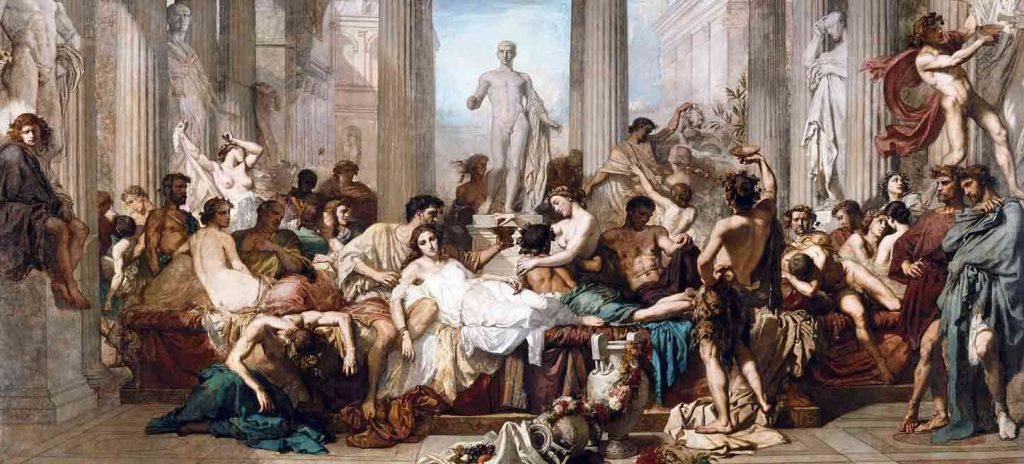
Across the Aegean Sea, in the heart of the Roman Empire, perfume-making underwent further refinement and innovation. Inspired by the traditions of Greece and Egypt, Roman women adorned themselves with fragrant oils, using them not only to scent their bodies but also to adorn their hair in elaborate hairstyles reminiscent of ancient rituals. Roman women imitated the ancient Egyptian practice of kneading fragrance into herbs that were put in wax beads; these beads were worn on hair and allowed to melt under the sun. This practice laid the foundation for diffusion of perfumes and scents as seen in the modern age.
Building upon existing knowledge of their predecessors, the Romans pioneered new techniques in perfume-making, including the distillation process and the use of glass vials for storage. With access to a wealth of raw materials from their vast dominions, including roses, pomegranates, lavender, and exotic spices, the Romans created perfumes of unparalleled richness and complexity.

But it was not just the ingredients that set Roman perfumes apart; it was also the craftsmanship and artistry that went into their creation. From the meticulous blending of oils to the exquisite design of their vessels, Roman perfumers elevated their craft to new heights, leaving a lasting legacy that endures to this day.
The scented balms and oils of ancient Rome emerge as a testament to the sophistication and ingenuity of one of the greatest civilizations the world has known. In ancient Rome, there were no master perfumers as we know them today, no “noses” trained to discern the subtle nuances of fragrance. Instead, the art of perfume-making was the domain of those who could afford to indulge in the luxury of experimentation, each ointment a unique blend of ingredients that reflected the ever-changing fortunes of the empire.
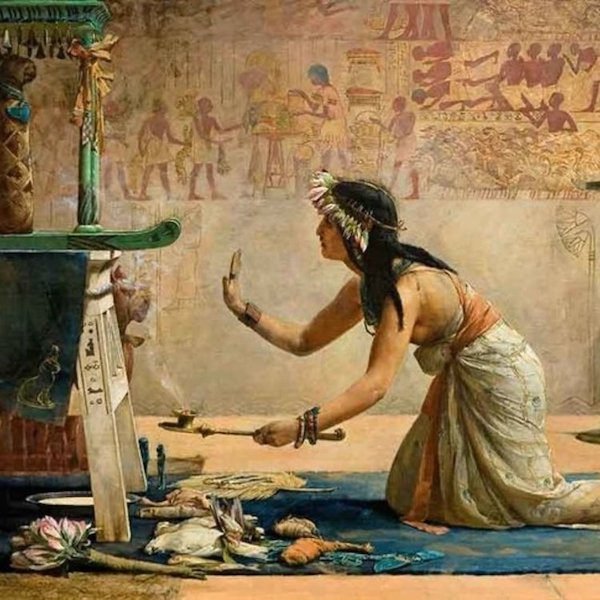
Scented ointments were not merely indulgences for the wealthy; they were valued for their medicinal properties, used to cure diseases, ward off epidemics, and conduct religious ceremonies. Derived from the Latin term “per fumum,” meaning “from smoke,” perfumes were intimately connected to the sacred, with priests throwing scented ointments on braziers to create fragrant offerings to the gods.
Perfume was also a means of personal hygiene in a world where soap was a luxury few could afford. Patricians cleansed themselves with a mixture of clay and oil, scraping away dirt and grime with a tool called a strigil. These concoctions, including essential oils, possessed healing properties. Lavender was a particular favorite, used to promote relaxation and treat a variety of ailments.
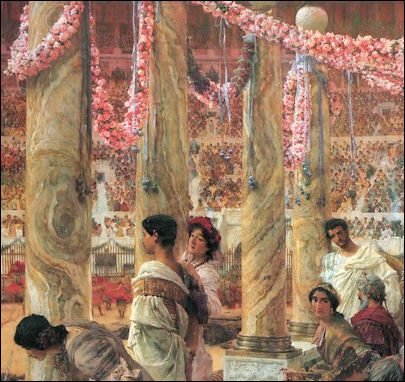
Essential oils and balms were valued for their medicinal properties. Claudius Galen, a Greek physician and surgeon, treated gladiator wounds with herbs and essential oils, with remarkable success. Galen maintained a pharmacy stocked with essential oils, herbs, and plants renowned for their health-promoting properties. Among these oils were fennel, elecampane, and silphium. Fennel, a popular snack in modern Italy, offers various health benefits when used as an oil, including calming nerves, promoting relaxation, and aiding in wound healing. Elecampane, known for its digestive benefits, also possesses anti-inflammatory properties, boosts immunity and metabolism, and aids in respiratory clearance, making it a common remedy in Ancient Rome. Silphium, though shrouded in mystery today, was considered the ultimate cold medicine in ancient times, believed to alleviate fever, aches, pains, coughs, and indigestion, despite its eventual extinction.

In the wake of the fall of the Roman Empire and the rise of Christianity, the use of perfume waned, as the new religion sought to erase all traces of pagan traditions from the collective memory. But the art of perfume-making endured, practiced in secrecy by those who valued its therapeutic properties and its ability to uplift the spirit.
With the renewal of trade between East and West during the Crusades, perfume-making experienced a renaissance, as exotic spices and aromas from distant lands found their way to the markets of Rome. From that moment on, the art of perfumery flourished, evolving into the sophisticated practice that we know today.
The modern idea of diffusers and air fresheners originated from the Romans’ use of essential oils to infuse official ceremonies with aromatic scents. The primary raw materials, readily available under Roman rule, consisted of roses, pomegranates, lavender, quinces, grapes, rosemary, and basil. Additionally, cinnamon myrrh, opobalsam (a traditional incense), resins, and various roots were prized as the most valuable ingredients for creating fragrances during that time. Perfumers drew inspiration from the botanicals of the Romans and Greeks, various scent combinations and raw materials used are directly informed by the practices of the perfumers and artists of ancient Greece and Rome.
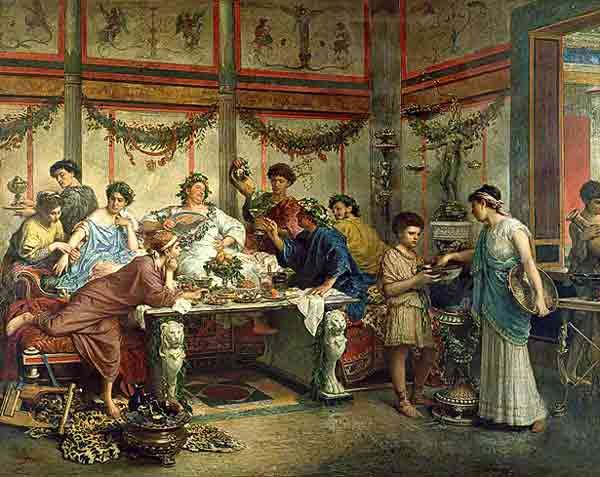
The Greeks were known for their meticulous documentation, including documentation of their growing art of perfumery. It is due to the inscriptions and reported innovations of the Greeks and Romans that perfumers and artists are able to recreate the perfume-making process in the modern age, preserving a link to our olfactory past.
In delving into the ancient world’s perfume practices, we unearth a treasure trove of cultural richness and innovation. Perfume wasn’t merely a luxurious indulgence but an integral aspect of daily life, deeply intertwined with religious rituals, social customs, and personal adornment. Originating in Egypt, the art of perfumery disseminated across civilizations, finding fertile ground in the hearts and homes of the Greeks and Romans.
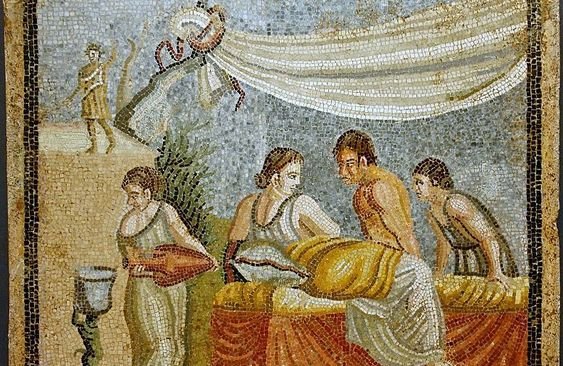
The Greeks and Romans inherited and expanded upon the olfactory legacy of Egypt, infusing perfume with their unique cultural sensibilities. Perfume became a sacred symbol, associated with divine favor and used in religious rites to sanctify life’s passages. As the art of perfume-making flourished, it became intertwined with everyday life, from public festivals suffused with fragrant waters to elaborate bathing rituals steeped in luxury. The Greeks, in particular, embraced perfume as a holistic approach to health and well-being, exploring its therapeutic properties under the guidance of figures like Hippocrates, the “Father of Medicine.”
With the rise and fall of empires, the use of perfume waxed and waned, but its allure endured. The resurgence of trade between East and West during the Crusades sparked a perfume renaissance, ushering in a new era of exploration and innovation. As exotic aromas from distant lands found their way to European markets, the art of perfumery evolved into the sophisticated practice we know today. Preserving ancient techniques while embracing modern advancements, we continue to honor the legacy of our olfactory past, enriching our lives with the timeless allure of fragrance.


